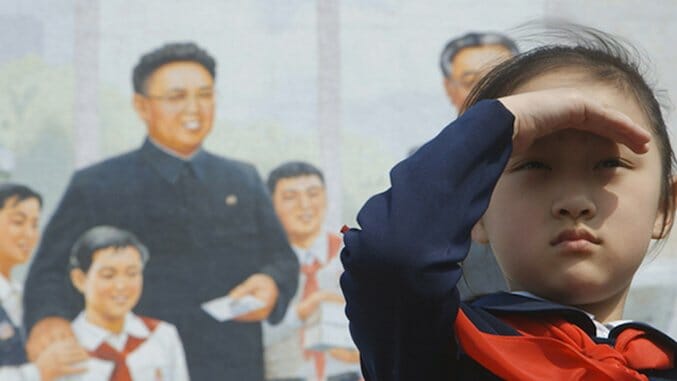Under the Sun

For as long as there have been documentaries, there have been debates about what exactly constitutes “reality” in those films. Labeling these movies as nonfiction has always been misleading—just because you’re capturing “real” people doing “real” things doesn’t mean you’re necessarily presenting an unfiltered representation of real life. Every documentary filmmaker is offering his or her version of the truth, and observant audiences should always question the “reality” they’re watching. It’s not that these directors are actively deceiving us—it’s just that real life is never quite as unvarnished or straightforward as we pretend to think it is.
The terrific documentary Under the Sun doesn’t just bring these questions to light but makes them part of the film’s central focus. Daring and thought-provoking, director Vitaly Mansky’s film uses one North Korean family to examine how everyone—moviemakers, governments, even individuals—contorts reality to fit specific purposes.
In an opening on-screen crawl, we’re informed that Mansky and his team were given a script from North Korean officials, who wanted to commission a film about a typical, happy mother, father and daughter living in Pyongyang. As Under the Sun rolls along, though, it becomes clear that Mansky doesn’t just have to follow a script but also the rules laid out by a mostly off-camera overseer, who directs the family and others how to behave. (Repeatedly, the father’s and mother’s coworkers are instructed to react more demonstratively about some good news.) In addition, falsities are presented as facts: Both parents have been given more prestigious jobs than the ones they actually have, and the family has been moved to a better home for the shoot.
A more simplistic Under the Sun would merely enjoy these bizarre distortions of reality, making satiric sport of North Korea’s obsession with manufacturing a triumphant narrative about itself as a feared, unequaled global superpower. (For instance, schoolchildren are taught that past Korean leaders hurled boulders to vanquish their foreign enemies.) And at first, the Ukrainian-born Mansky seems content to let his film stay on that bemused surface. But soon, Under the Sun becomes a penetrating essay about surfaces themselves, asking us to examine how we receive information from movies, whether they be dramas, documentaries or state-sanctioned propaganda.
-

-

-

-

-

-

-

-

-

-

-

-

-

-

-

-

-

-

-

-

-

-

-

-

-

-

-

-

-

-

-

-

-

-

-

-

-

-

-

-








































